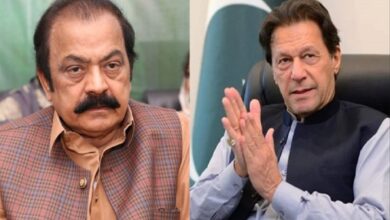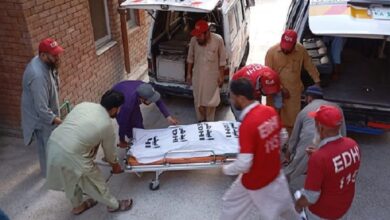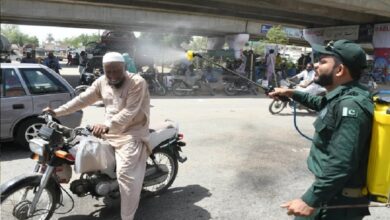Looming Pakistan Coup Would Be a Win for China
March 14 was a dramatic day for Pakistan. This was the day, the country’s military said, that it would arrest Imran Khan. He was once an international cricketer, then a politician, then prime minister, and is now, after being deposed as PM by a no-confidence motion last year, a tub-thumping campaigner against what he describes as a corrupt system tying the Pakistani military and the rest of the country’s political parties together. (I was a policy adviser to Khan between 2012 and 2014 but have no professional contact with him at present.)
But the day turned into a triumph for Khan after the police were unable to arrest him. The aftermath has been unlike anything in contemporary Pakistani history. The military, which has governed the country alongside chosen cooperative politicians since independence from Britain 75 years ago, now faces a serious threat from an insurgent who uses the language of democracy and the rule of law. And in response, it’s increasingly possible that the military, tired of playing chess against Khan, will simply sweep the pieces from the board.
In recent months, Khan has led his supporters in a series of mass rallies and mass marches. He has been shot at and wounded. His political supporters have clashed with police; they say they were attacked, while the police say the opposite. And members of Khan’s Pakistan Tehreek-e-Insaf (PTI) party have been arrested and, they allege, tortured in police custody. One supporter was allegedly tortured to death last week.
This all came to a head on March 14, when Khan was due to be arrested on what his supporters say are trumped-up terrorism charges. Large numbers of Khan’s supporters gathered outside his home in Lahore, Pakistan, to contest the arrest. Police used tear gas, water cannons and batons to attempt to clear a path into Khan’s home. They were repulsed by the crowds. Khan remains free.
In a video message posted to Twitter, Khan remained defiant. If he is arrested, he said, his allies must fight for “true freedom” and the rule of law. Khan maintains that he and his party have been set up: that the charges against him are malicious and false, and that the intention of any arrest would be to disqualify and deprive him of the ability to take his months-long campaign into a forthcoming general election.
As I reported last year, after Khan lost power in a close no-confidence vote in April 2022, he began a barn-burning campaign of rallies and speeches contesting the legitimacy of power in the country. He accused the military of having received its orders to remove him from the United States; he said that the judiciary in the country was hopelessly corrupt; and he launched a serious assault against the military’s place in Pakistani society, including its stranglehold over the country’s economy.
Throughout Khan’s campaign, the military and other politicians have attempted to defer what increasingly looks like a grassroots political revolution: Khan was charged with terrorism offenses for “threatening” a judge and officials; he was also accused of corruption for accepting gifts while in office. His rallies have been broken up. His broadcasts have been subject to restrictions. And he has been shot.
But now, those in office in Pakistan are facing a solid deadline: The politicians and military have only until October this year to call elections under the country’s electoral term limits. Khan’s PTI party has won several local and regional contests since he was removed from power. Khan’s party won a plurality of the vote in the last election, in 2018; followed by the PTI taking 15 of the 20 contested seats in the legislative assembly of Punjab state—the most populous province of Pakistan and a former stronghold of Shehbaz Sharif, current prime minister and Pakistan Muslim League party leader—in the 2022 local elections.
If another election is held and the polls are accurate, it is likely Khan would win with an overwhelming majority. This is a threat to the military and the parties currently in government alike: If Khan were to win, he would do so on a platform explicitly oriented around reining in the military and clearing out the current politico-legal system, including a reform of the country’s judiciary.

![Mumtaz Zahra Baloch, spokesperson for Pakistan's Foreign Ministry, says the country believes in constructive dialogue with the US [Courtesy of Pakistan Ministry of Foreign Affairs]](https://southasiancorrespondent.com/wp-content/uploads/2024/06/pak-1-390x220.jpg)


